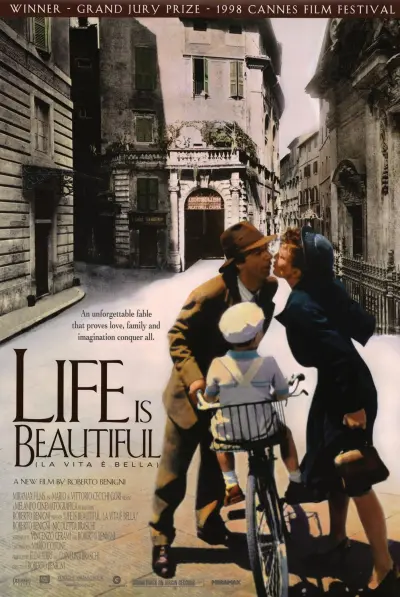
"La vita è bella" (Life Is Beautiful), the 1997 Italian comedy-drama film masterfully directed by Roberto Benigni, who also stars in the lead role, is an emotionally profound and touching narrative set amidst the harrowing backdrop of the Holocaust. This film is an extraordinary amalgamation of humor, affection, and tragedy, effectively exploring the themes of human resilience, the transformative power of imagination, and the steadfast endurance of the human spirit against the backdrop of immense suffering.
The story is artfully divided into two parts. In the initial segment, we are introduced to Guido Orefice, a charismatic and witty Jewish Italian bookshop owner. The setting is 1939 Fascist Italy, where Guido arrives in Arezzo, Tuscany, to work at his uncle Eliseo's restaurant. Guido's endearing personality, marked by his keen wit and ability to infuse humor into everyday life, instantly captures the audience's heart. He falls in love with Dora, a beautiful schoolteacher engaged to a local government official. Through a series of enchanting and romantic endeavors, Guido wins Dora's heart, leading to their marriage and the birth of their son, Giosuè.
The second part of the film unfolds during the tumultuous period of World War II, as Northern Italy falls under Nazi occupation. The narrative takes a dramatic turn as Guido, his uncle Eliseo, and his young son Giosuè are forcibly taken to a concentration camp. Dora, though not Jewish, chooses to board the train to the camp to remain with her family. Within the camp's confines, Guido and Dora are separated, and Guido is faced with the daunting task of shielding his son from the camp's brutal reality.
Perhaps the most poignant aspect of the film is Guido's use of his rich imagination to protect his son. He constructs an elaborate fiction, portraying their grim reality as a complex game, with the ultimate prize being a real tank. This inventive approach by Guido serves as a powerful means to preserve Giosuè's innocence and instill hope in the midst of despair and cruelty.
The film reaches its climax in a simultaneously tragic yet uplifting moment. As the Allied forces near and the camp descends into chaos, Guido hides Giosuè, telling him it's the final challenge in their game. Tragically, Guido is apprehended and executed by a German soldier. In his final moments, he continues the charade for his son, offering a playful wink as he is led to his death. The next day, as the camp is liberated, Giosuè, still believing in the game's narrative, is overjoyed at the sight of an approaching U.S. Army tank. He is soon reunited with his mother, Dora, blissfully unaware of his father's fate.
"Life Is Beautiful" stands as an exceptional film that remarkably finds elements of humor and hope amidst one of history's darkest chapters. It is a powerful testament to the unyielding spirit of paternal love and the extraordinary lengths a parent will go to safeguard their child. The film's title, "La vita è bella," is a poignant encapsulation of its core message: even in the face of overpowering darkness and adversity, life retains its beauty. This cinematic work is not merely a tale of survival in a concentration camp; it is an inspiring story about the resilience of the human spirit, the profound power of love, and the enduring strength of family bonds.

